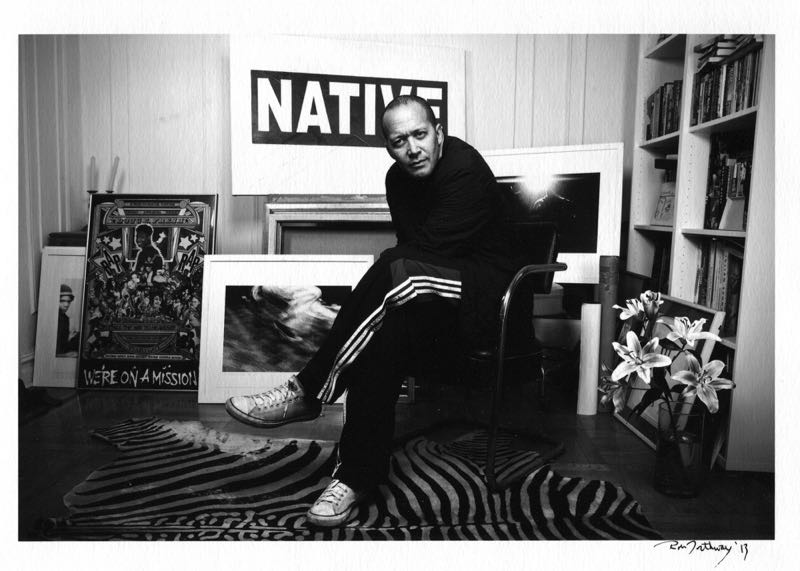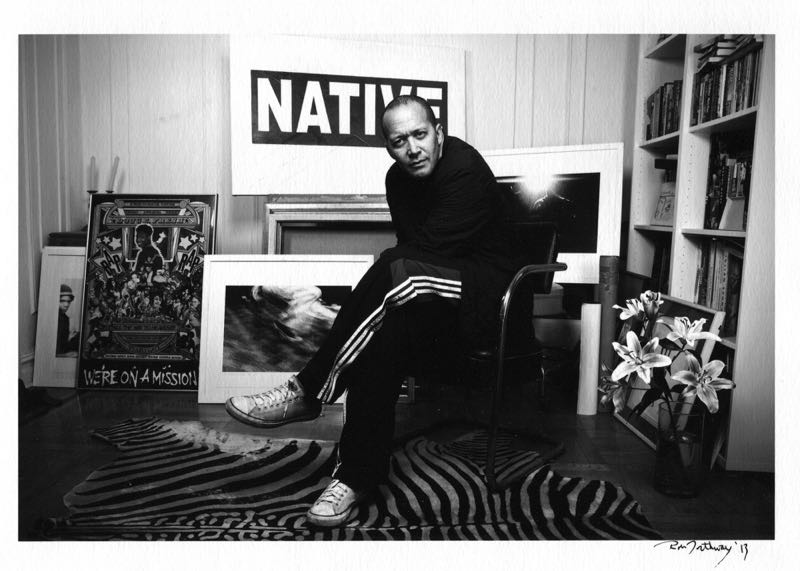
[caption id="attachment_62009" align="alignnone" width="800"] Michael Holman. Rob Northway photo[/caption]
Michael Holman. Rob Northway photo[/caption]
By Michelle Trauring
New York, circa 1984, was like Paris of the 1920s. The downtown art scene and the uptown hip-hop scene were on fire at the same time, and not only did Michael Holman live through it, he helped shape it.
“It was the zenith of our own Belle Epoch. One hundred years from now, that time will be compared to the Italian Renaissance and every other Belle Epoch the world has experienced,” said the filmmaker, artist, writer, and musician who co-founded the band Gray with painter Jean-Michel Basquiat; created, managed and choreographed the New York City Breakers; and made the first nationally broadcasted hip-hop television show, “Graffiti Rock,” a reality in 1984.
Through Mr. Holman’s spoken word performance piece, “Confessions of a Subculturalist,” he brings this era back to life, as well as the years before and after, through his personal experiences and his archives.
“It’s taken all my life, almost up until the present moment, to collect and tell these stories,” he said.
When pressed for details during an interview with The Sag Harbor Express, he was tight-lipped. But this is what he did say.
When was the first time you came out to the Hamptons?
I first started visiting Sag Harbor in the mid-1990s when I found opportunities to sail at the Sag Harbor Yacht Club. Then, my good friend, [artist] Sabina Streeter moved to Sag Harbor and she would invite me to visit often. We both go back to the Mudd Club days where we were regulars— and that history is quite bonding, emotionally. She also grew up in Bavaria, and so did I as an Army Brat, stationed in Germany, in the early 1960s. We're around the same age, so we have so much in common.
Have you always been a creative type?
Yes, I've always, always been creative, but I've always, always expressed my creativity through multiple eclectic means. I've always wanted to do what I wanted to do as an artist, and never let reason or practicality stand in my way—sometimes unfortunately. I was a polymath, a Renaissance artist, long before it was popular. And the drama and conflict being so desperately disparate has caused me makes for great stories, I hope.
Did you ever have an ah-ha moment, when you realized you were doing the right thing?
No. Never. Perhaps if I did, I wouldn't have any reason to carry on, searching, looking, hoping I was doing the right thing. Maybe never knowing if I am or not is my own particular cross to bear. And the never knowing if this or that is the right thing keeps things fresh, alive.
Sure, I've had moments when I knew I was an artist, and it was the artist's life for me. But knowing what that meant exactly, and how I would find clarity and true meaning in my life, and how I can make that important for the world—I suppose every artist's dilemma—has always eluded me. Was always just out of reach. Friday's performance of “Confessions...” is simply part of that “searching,” I suppose.
When did you start writing "Confessions of a Subculturalist"?
I've been "writing" "Confessions of a Subculturalist" all my life. By "writing," I simply lived these biographical stories and committed them to memory. And I've been telling these stories to friends and family ever since they've happened to me. I've told some of these stories/episodes from my life on stage during spoken word performances over the years, but Friday's performance will be more comprehensive in terms of the stories fully capturing my life, and all the moments that shaped my life, as an artist.
Walk me through it, without giving the whole performance away?
I will be telling a number of short stories that I hope shed light on my development as an artist, beginning from 7 years old, and going up until very recently. I have not ended my journey by a long shot, so it's very much an open-ended narrative trajectory.
Each story shows me living through a dramatic experience that shapes me as an artist in some way. As time moves on, my artistic credentials grow, but my quest maintains its urgency: finding my true voice as an artist. All artists, all peoples, experience similar journeys. Mine, I suppose, is unique in so many ways that I believe that will be the reason the audience will be moved. I think I've also been lucky to have been at the right place at the right time, in terms of American pop culture. And my Zeitgeist credentials are startling, when you step back and look at it from an historical perspective.
The journey of "Confessions..." isn't just about me, but about the times—from the early 1960s until now—I have lived through, and how they have influenced me, and how I, in turn, have influenced pop culture.
You were the first to use "hip hop" in print. How did that come to be?
Like most historic moments, it was an accident, certainly not intended. I happened to use and define the term in an interview with DJ Afrika Bambaataa, as he, the interviewee, and me, the interviewer, attempted to describe hip hop culture during its earliest moments of media exposure in the small East Village newspaper, The East Village Eye.
How has the hip hop scene grown since the 1980s?
Well, to most people, that will be obvious. From a street subculture, created to bring joy and fun to underprivileged communities by inventive, creative artists from these same communities, to a global, multi-billion dollar industry that has rewarded many deserving people, and not so deserving people, alike. But isn't that how it always is?
Where do you hope it’s headed?
To become a force of charge through politics, and political representation. To do what rock ‘n' roll did for middle class kids in the 1960s, for poor and working class people all over the world. Give identity and political clout.
I believe hip hop has and will continue to be the first cultural movement that has ever represented the poor and working class directly. They never had a voice before. But before the 1960s and rock ‘n’ roll, teenagers never had a real voice before. Times, they are a-changin’. Of course, my cynical side can imagine people being exploited over again, no matter what lasting impact hip hop has. But in every corner of the world, working class kids are discovering rap, break dancing, graffiti art and turntablism, and are using these "tools" to express themselves in ways that were never open to them before.
What do you hope audiences take away from "Confessions"?
That the stories I'm sharing about my life, that are so special, that I can use them as entertainment, happens all the time to them, as well.
It's just that people don't realize they're living in an amazing story. Most people think great stories only happen to lucky people. They happen to us all. You just have to be paying attention to your own life.
What is next for you?
More creativity, and more sharing of it, until I get to the bottom of what this is all about!
Michael Holman will present “Confessions of a Subculturalist” on Friday, March 24, at 7 p.m. at the Southampton Arts Center. Tickets are $10. For more information, visit southamptonartscenter.org.